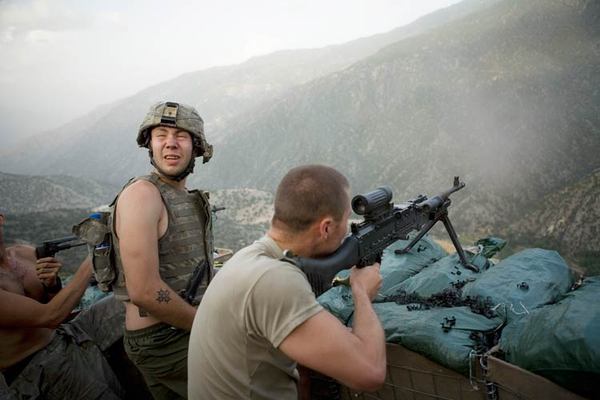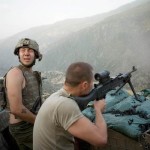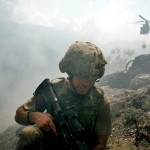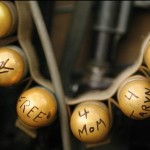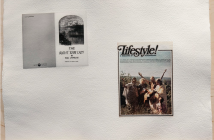This is the scene that tells everything. The soldier is visible only from the chest down, wearing shorts, sneakers, and no socks. He is firing an automatic weapon. The spent bullet casings are falling around his feet , except for one that slides down his leg and into his shoe. For a brief moment, nothing more happens, but you know what is coming. Suddenly the man reaches down to pull the sneaker off and flip the piece of burning metal out of it. Such a small, absurd wound hardly seems to matter in the midst of the larger violence surrounding it. Yet this documentary ends up revealing that nothing of what happened in this place matters much more than that.
My father rarely speaks of what his experience of war was like, but he did once recall that, as he came ashore on Omaha Beach in 1944, what went through his mind was the question "What am I doing here?" Such a thought would certainly have been familiar to the young, armed, American men who flew some two years ago into the Korengal Valley of Afghanistan for the first time. This was their nowhere that they had landed in the middle of. Everywhere there are steep blades of rock telling the new arrivals that they have come to a place where they do not belong, a landscape that forgives nothing, and which would soon be marked with the names of their dead.
The title of the film is one of those, although a soldier describes the outpost that shares the name as "just a shitty place" that is nothing like the man whose memorial it was meant to be. The faces of those who will die, or be hurt, come and go on the screen, with no way to anticipate what will happen, or to warn them. We sit in the theater being offered griefs we would otherwise never know, and which we are likely to refuse, as did the young man who, after seeing his friend's corpse on a hillside, "wanted to cry, but didn't..."
None of the men men who give witness in this film have anything to say about foreign policy. They are fighting private wars, defending companions of necessity rather than choice. And they find satisfactions in fantasies that mirror their reality, playing shooter video games just before combat. The preparation they have had from the culture in this country is more thorough and ordinary that we like to think. In a conversation about his home, one soldier describes his family's ranch in a way that fits none of the stereotypes which his companion expects but is, rather, "a whole bunch of land that you kill things on." He then pauses, and says, "like here." 'You can't get a better high,' says one soldier, matter-of-factly. 'It's like crack, you know. Once you've been shot at you really can't come down, you can't top that." In the book entitled War which Sebastian Junger, one of the film's director's, wrote about his experience in Afghanistan, much more is made about the addiction that comes from this legitimized violence, not very different from the world that Michael Herr in his writing about the Vietnam war described as like the feeling of undressing a woman for the first time. This overwhelming attraction of being always at full pitch was the reason why the philosopher William James, writing at the very beginning of a slaughterous twentieth century, desperately hoped to find something he called "the moral equivalent of war" where the same thrill and camaraderie would leave its participants unharmed. But the young man who can't come down knows of no such alternative. "How are you going to go back into the civilian world then?' asks an interviewer. 'I have no idea,' says the young man.
As telling as this film is, what difference will it make? How many of the few people who will see it will not enter the theatre already convinced that these wars should end? How many more testimonies will we have about war making that are 'unforgettable' or 'deeply moving' (as some other reviews have styled this film), yet still useless in bringing an end to it? If All Quiet on the Western Front or Catch-22 or Born on the Fourth of July have changed nothing, why will this? We are left instead with numerous young men and women like the one interviewed after his return home from Afghanistan who declares that "I prefer not to sleep and not dream about it..." But he will.
- Specialist Misha Pemble-Belkin (l.) and fellow soldiers from Battle Company, 173rd US Airborne during a firefight at Outpost Restrepo during combat in Afghanistan’s Korengal Valley. Korengal Valley, Afghanistan, Kunar Province. 2008. A film still from the documentary RESTREPO by Tim Hetherington and Sebastian Junger. Photograph © Tim Hetherington
- Promotional still from RESTREPO
- Promotional still from RESTREPO
RESTREPO, Directed by Sebastian Junger and Tim Hetherington
Images via the RESTREPO website.

